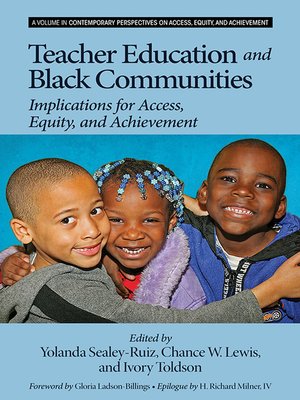Teacher Education and Black Communities
ebook ∣ Implications for Access, Equity and Achievement · Contemporary Perspectives on Access, Equity, and Achievement
By Yolanda Sealey-Ruiz

Sign up to save your library
With an OverDrive account, you can save your favorite libraries for at-a-glance information about availability. Find out more about OverDrive accounts.
Find this title in Libby, the library reading app by OverDrive.



Search for a digital library with this title
Title found at these libraries:
| Library Name | Distance |
|---|---|
| Loading... |
The field of education has been and will continue to be essential to the survival and sustainability of the Black community. Unfortunately, over the past five decades, two major trends have become clearly evident in the Black community: (a) the decline of the academic achievement levels of Black students and (b) the disappearance of Black teachers, particularly Black males. Today, of the 3.5 million teachers in America's classrooms (AACTE, 2010) only 8% are Black teachers, and approximately 2% of these teachers are Black males (NCES, 2010). Over the past few decades, the Black teaching force in the U.S. has dropped significantly (Lewis, 2006; Lewis, Bonner, Byrd, & James, 2008; Milner & Howard, 2004), and this educational crisis shows no signs of ending in the near future. As the population of Black students in K-12 schools in the U. S. continue to rise—currently over 16% of students in America's schools are Black (NCES, 2010)—there is an urgent need to increase the presence of Black educators.
The overall purpose of this edited volume is to stimulate thought and discussion among diverse audiences (e.g., policymakers, practitioners, and educational researchers) who are concerned about the performance of Black students in our nation's schools, and to provide evidence-based strategies to expand our nation's pool of Black teachers. To this end, it is our hope that this book will contribute to the teacher education literature and will inform the teacher education policy and practice debate.







